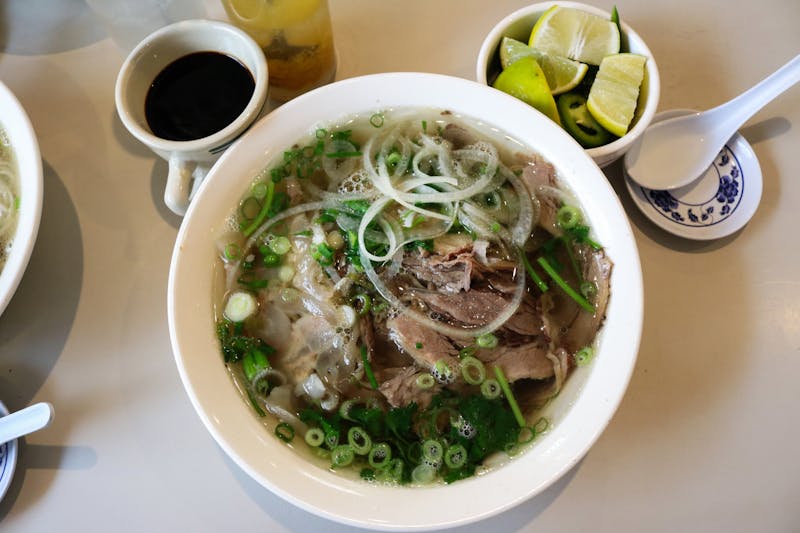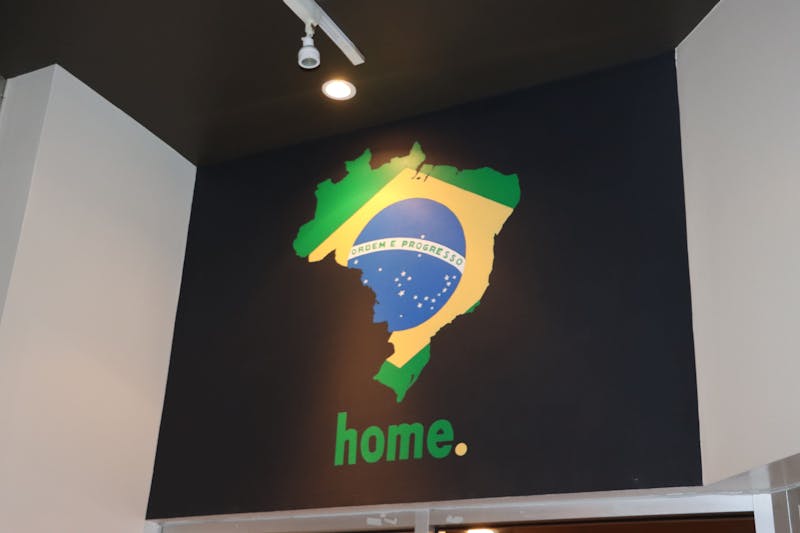There’s a quaintness to Jacques–Jean “J.J.” Tiziou’s abode on Osage Avenue beyond the kind typically embodied by West Philadelphia's colorful rowhomes. It’s reflected in the year–round Christmas lights strung across the narrow zigzag staircase and above the table, which, aside from a small lamp, are the only source of light in the dark wooden dining room. Deep shadows paint the faces of the soirée guests. Brows furrowed and eyes twinkling, the visitors exchange words and bowls of thick pottage. Somehow, I’ve found myself a part of the semimonthly tradition as nearly as old as I am—Tiziou’s French soirées.
The spread on the table before us is large and hearty. Every hand assists in lowering the enormous pot of just–made vegetable soup onto the table, complemented well by pillowy loaves of nutty bread baked by Tiziou and cubes of cut–up cheese in various shades of orange. The secret ingredient to the main course? A sprinkle of pulverized insects, of course.

Credit: Noah Eggerts
“The original idea was that it was called ‘Francais et Fromage,’” Tiziou explains. “When I was living with my former housemate, we had the idea to host some one–offs here and there, and now it's become more regular.”
Tiziou is referring to his dinners, conducted entirely in French, welcoming guests from all over Philadelphia and even the world. The concept of breaking bread to bring people together is certainly not a new one, nor acquiring language skills through immersion in food and community. Yet, it’s the casual cohesion—the seamless melding of these two circumstances—in the Osage soirées that’s been executed to an enviable degree.
Tiziou’s dinners are his own take on, though in many ways distinct from, the phenomenon of “language tables,” a great way of practicing those skills in a setting that isn’t necessarily a classroom or club. In my brief time attending these language tables, I’ve exchanged conversations with native speakers, budding polyglots, and even supportive sidekicks who tag along for some homemade soup and a laugh. There’s representation from more than a dozen countries, from Ghana to Romania. Children buzz excitedly to Tiziou about their favorite cartoons as he blends vegetables in the kitchen. An elderly man passes around his newest prized piece of writing, a chapter about these very soirées from a larger work about his experiences in America. A red–lipped woman with a blunt bob passes through the dining room and into the kitchen, where I’m sitting with another guest. In epic West Philadelphia fashion, she spends several minutes searching for a composter for her one orange peel.
Tiziou fills me in: “About half of the crew is devoted regulars, and half of the crew is dropping in every once in a while, or a new person, or someone who hasn't shown up in eight months who all of a sudden comes back.” Bearing their own contributions for the table, from cornbread to Cabernet, the participants come as they wish with whatever they wish, as long as they’ve brought along a cheery attitude and a willingness to try.
Incredibly, some of the dinner guests who are quickly welcomed to the table, greeted like old friends, are meeting Tiziou for the first time, having heard about the soirées through the grapevine. There isn’t one judgmental gaze, no critique masquerading as a helpful remark.

Credit: Noah Eggerts
Tiziou is breezy in his description of the event, framing it as more of a thrown–together, last–minute dinner party than a longstanding community tradition. “It's wonderful for people to … be able to share a meal together,” he says. “Making it a pretty regular offering has made it something that folks can look forward to. That’s all there is to it, really.” And pretty regular it is. One guest, Christian, offhandedly tells me over his bowl of soup that he’s been attending on–and–off for nearly a decade. When I bring this up to Tiziou, he sits and stares blankly at me for a moment, a grin spreading across his face. “Is that possible? I guess, maybe. Has it really been that long?”
Originally hailing from Washington, D.C., Tiziou matriculated at the University of Pennsylvania and graduated with a bachelor's degree in fine arts in 2002. He’s stuck around ever since, saying simply, “Philadelphia felt like home the minute I got here.” A Francophone by birth, he found himself out of practice with his native language and away from home in nascent adulthood. What persisted, though, was Tiziou’s determination to not just hang onto his French, but to enrich it.
“I’ve used [French] a lot in a family context, but that’s basic around–the–dinner–table stuff. If I start to try to talk about public art or community organizing, I just don’t always have the vocabulary,” he says.
Isabelle Wozniak, a soirée attendee, heard about the dinners through her partner. Like Tiziou, Wozniak comes from a French–speaking home. “Because of my day–to–day life, I really don’t have opportunities to practice [the language]. I’ve been coming here just as a way of reconnecting with [my childhood and identity],” Wozniak says.
This is a familiar sentiment for many Penn students. With the international student population of the Class of ‘27 spanning 97 countries and the existence of an (albeit inconsistent) language requirement, it’s perfectly plausible that the majority of the undergraduate body is composed of multilingual students. There’s no shortage of groups that cater to these varied linguistic, cultural, and racial backgrounds on campus, and there’s plenty of non–English spoken on campus as friend groups converse in their respective native tongues. However, outside these protective bubbles, English is the bridge between students, allowing us to communicate with one another.
Our spirited times in the city and the memories we make throughout our years at Penn are preserved in the language of our thoughts, and in conversation with our peers, forcibly translated into the English word. We’re evaluated academically through essays and exams, and as a result, find ourselves forced to do our most difficult thinking in English.
“I think part of this is because the experiences, the stories, that we experience on a day–to–day basis at the University of Pennsylvania are all in English. Therefore, we have a natural tendency to retell them in the language we experience them,” says Tony Tian (C, E ‘27) who, aside from English, speaks French and Mandarin. So, our native languages unwillingly take the backseat. In our pursuit of knowledge, and the practical necessity of doing it in the common tongue, other languages are put on hold, and in some instances, even relegated to their adolescent forms.
Both Tiziou and Wozniak expressed a desire to be able to speak about their adult interests in their shared native language. The French soirées emerged as a potential solution, with Tiziou providing a homey space that poses no intimidation to its guests, allowing for an openness that coaxes language out of attendees.
While the population of Tiziou’s guests skews more towards near–fluent speakers than learner—he estimates the split to be about 80/20—a decent number are still working towards proficiency from scratch. Christian, as it turns out, is not a native French speaker at all. “People have ranges of ability. Tonight … I’m probably the worst,” he exclaims joyously, bursting immediately into a fit of laughter. “Everyone says language learning as you get older is harder. That’s true because of our environment, not because of our brains.”
Regardless of whether or not there’s scientific truth in that sentiment, it’s impossible to deny the effect of the French soirée environment on those who’ve gathered. Having had a “really poor relationship” with his French teacher in high school, Christian failed his introductory language class, and didn’t pick it back up until many years later, after “traveling, being in Ghana, and being exposed to true cosmopolitanism.” In his second attempt, Christian’s newfound devotion to language learning propelled him toward success quickly. He worked with free language software like Duolingo and HelloTalk, in addition to attending Tiziou’s language tables.
“I think it’s also, being a person of African descent, not in touch with that part of myself, in a way. This is really kind of like a way to reclaim that. But it’s also really important, I think, because I saw how it impacted people when I tried to speak their language. It brought out joy,” he explains.

Credit: Noah Eggerts
Tiziou’s attitude is also a contributing factor. He seems completely unbothered by the vulnerability of offering up his own home in its unfiltered state, encouraging others to experience it the way he does. He attributes his openness in his adult life to his early life experiences and influences, like photographing indie events and house concerts, as well as frequent dinner parties hosted in his childhood home.
A figurehead in the West Philadelphia social sphere, who, in his own words, “[likes] to play the community resource connector,” Tiziou takes it upon himself to provide for his neighbors by dreaming up events of all kinds. He speaks with a zeal for organizing, as if it’s his duty from birth. Given the size and diversity of the crowd that adores him, both in and out of the dining room, and the fact that the first unifying question at the table between any two strangers is “How do you know J.J.?,” it’s completely believable.
It feels almost too good to be true—the way he explains every one of his circumstances as a gift, permitting him to provide service. His house is large because it’s meant to be filled with people, “open and designed for hosting.” He lives alone so he can put his energy into “community tending” and creating new families by bringing together strangers with shared interests. “There's at least one baby in England right now who I probably have a photo of the moment the parents met, because it was one of the house concerts I hosted when I used to live next door,” he adds nonchalantly, as if matchmaking at his home is a regular occurrence. There is a simple and contagious beauty in how Tiziou is able to turn his hobbies into a mission he believes in so sincerely.
Language tables exist at Penn, too. Kings Court English College House, home to the Perspectives in Humanities program community, has a similar mission of protecting and promoting language. Three times a week, Chinese, Spanish, and French–speaking students meet on their respective days in the private dining room to share in a meal and practice speaking in another language. Yet, these sessions don’t seem particularly popular among students, given their low attendance rates, which hover in the single digits. Usually after a few minutes conversation quickly devolves into English.
Tony, a student coordinator of the KCECH French language tables, adds: “I think it is challenging to maintain a French–speaking environment through the KCECH French table because there is such a large range of familiarity with the language that leads to people attending for different purposes. Someone who is much more experienced in French, or has spoken it at home, or has taken it at school, may be there for practice, whereas others who are less experienced, or are just beginning to learn, are there to actually learn.”
Christian offers a similar explanation. “You don’t have to know any French to come here. You will eventually be frustrated. You get to that point, and you’re like, ‘I’m so nervous, I don’t want to mess up.’ But here, there’s less of that pressure. It’s the perfect place to experience gentle failure,” he says.
Penn has countless communities, but very few are casual in their demeanor, meaning there’s almost nowhere to experience gentle failure. We stay in our lanes, bound by our own fears. We overly inflate the consequences of making mistakes, because we judge ourselves most harshly for what we deem failure. Above all, Tiziou’s French soirées are notable not for their openness, and not even for the strong, familial community of people that they have built. It’s the magical ease, the relaxation that comes with entering a room of people who aren’t afraid of falling.





